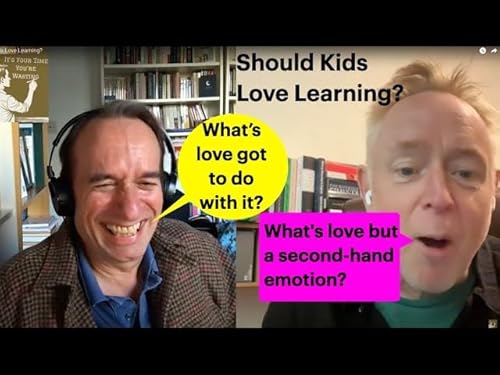
Should Kids Love Learning?
Failed to add items
Add to basket failed.
Add to Wish List failed.
Remove from Wish List failed.
Follow podcast failed
Unfollow podcast failed
-
Narrated by:
-
By:
About this listen
Should Kids Love Learning?
• Should kids love learning? Is love even important? What actually matters?
• Is this about engagement, motivation, wellbeing, stupidogenesis or something else?
The Education Divide
• Peter Hyman: the education divide that’s fuelling broader societal fractures.
• Questions:
o Is love of learning only available to the privileged?
o Is “curiosity” a luxury or a universal right?
• Social class, cultural capital, vocational vs academic, compliant vs questioning.
• Are we educating students to be clever conformists or thoughtful dissenters?
• If learning is about fitting in with the system, how do we preserve space for voices that challenge the system?
• Is dissent too often mistaken for disruption in schools?
Has the Love of Learning Been Lost?
• Education Politics Substack: system squeezes joy out of discovery.
• Do children love learning, or just discovery when it feels voluntary?
• Has accountability (Ofsted, exams) killed off curiosity?
• Should “love” be central, or is that a distraction from rigour?
• Intrinsic vs extrinsic motivation. Deci & Ryan: autonomy, competence, relatedness. Is “love of learning” really a by-product of system design, not an individual trait?
• How can schools create micro-environments of autonomy, competence, and relatedness even in a high-stakes culture?
The APPG Report
• All-Party Group on Love of Learning report.
• Key themes: curriculum narrowing, testing, wellbeing, disengagement.
• Can you legislate for “love”? Or is that sentimentalism?
• Is “love of learning” measurable? Or just rhetoric?
• What happens politically if schools churn out disengaged citizens?
• Hirsch (joy through mastery) vs progressives (joy through exploration). Do we aim to give children joy now (exploration) or joy later (mastery)? Or is it possible to design curricula that combine both — structured knowledge with space for wonder? Is “joy through mastery” a more honest aim than trying to make every lesson “fun”?
• Geary’s distinction: biologically primary vs secondary knowledge — kids may not “love” algebra, should we expect them to? maybe the goal shouldn’t be to make secondary knowledge feel fun, but to help students experience the delayed satisfaction that comes with having mastered it.
• Is “love” even the right word, or should we be talking about respect, perseverance, or meaning?
Should Kids Love Learning?
• Aristotle’s distinction between what’s pleasant and what’s good.
• Biesta: education as interruption of desire.
o If a child learns but never “loves,” is that failure?
o Do we confuse “loving learning” with “liking school”?
o Should schools prioritise joy now, or dividends later?
• Bjork on desirable difficulties — sometimes dislike in the moment = deeper love later. Bjork: “What enhances performance in the short term can often fail to support long-term learning.”
International Perspectives
• PISA/TIMSS on student attitudes.
• Finland (“joy in learning”) vs East Asia (high performance, high stress).
• Do we want kids to like school, or profit from it later?
• Is there a trade-off between love and mastery?
Towards Solutions
• What could change?
o Rebalance assessment: more formative, less punitive.
o Guarantee a broad entitlement: arts, play, philosophy.
o Restore teacher autonomy.
• Do we want citizens who can love, argue, and think — or workers who can comply?
Some links:
https://educationpolitics.substack.com/p/has-the-love-of-learning-been-lost?r=1rvl5x&utm_medium=ios&triedRedirect=true
https://peterhyman21.substack.com/p/the-education-divide-thats-fuelling?r=1rvl5x&utm_medium=ios&triedRedirect=true
https://educationappg.org.uk/wp-content/uploads/2025/07/APPG-LoL-Report.pdf
https://amzn.eu/d/fgWY2xB



